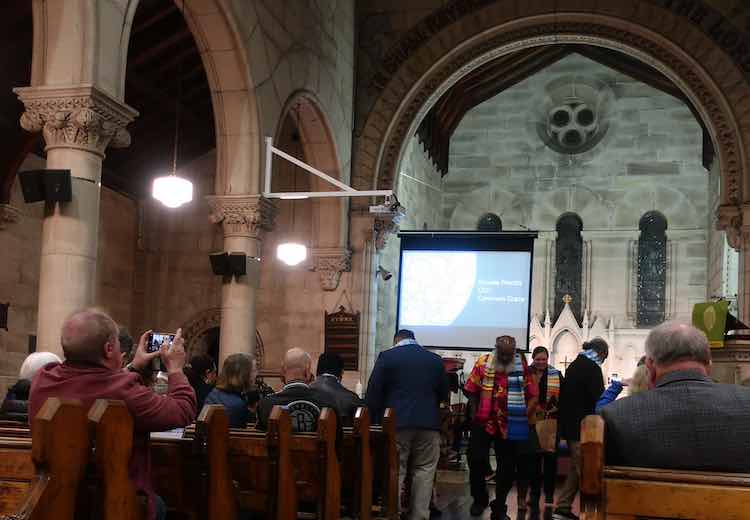I attended a church yesterday that has a semi-liturgical service, which included saying the Nicene Creed. I didn’t say all the words – read on for my reasons.
And it made me wonder. Do the Creeds still outline what the church believes? Do they adequately outline what modern Biblical studies have shown us?
Do they properly outline what I believe?
Creeds? What creeds?
In the first few centuries after Jesus, the Christian church had to work out what it believed and didn’t believe.
Jesus and the apostles had provided a bunch of teachings and example, but so many issues need to be resolved. Jewish Christians had to work out how Jesus could be divine and yet there was only one God. Formerly pagan Christians had to come to terms with ethical monotheism.
There were fights, disagreements and different church movements. Who could decide between the different views?
Councils and Creeds
Churches in different parts of the Roman Empire developed and inherited different traditions. New converts seeking baptism needed to be instructed in the faith, and so various question and answer statements of faith were developed.
But as the church spread, leaders felt the need to have broad agreement on various doctrinal matters across the whole church, and so, in a little more than two centuries (325-553), 5 church councils attempted to come to an agreement of the true and orthodox faith. Out of these councils came statements of faith, sometimes summarised into short creeds which could be repeated in gatherings and even learnt by heart.
The two most universal creeds, still in wide use today, were the Apostles Creed and the Nicene Creed. There are many other creeds, doctrinal statements and confessions, often developed within particular denominations and so not in wide use.
The Apostles Creed appeared in its present form in the fifth century, but was developed from earlier baptismal creeds written as early as the late second century. It is simple, short and easily understood.
The Nicene Creed was adopted at the first church council, at Nicaea in 325, and amended for the First Council of Constantinople in 381. It is a much longer creed, with many statements aimed at combatting various teachings considered heretical.
What’s wrong with the creeds?
The Apostles and Nicene Creeds were written more than a millennium and a half ago, into a different culture, language and church situation than we experience today. In particular, they were written largely to define orthodox doctrine and dismiss unorthodox views on questions relevant to their day, especially teachings around the Trinity and the divinity of Jesus.
So they contain many details that are still part of our faith today, but miss some important aspects and/or define doctrines that seem less relevant today.
Apostles Creed
I believe in God, the Father almighty,
creator of heaven and earth.
I believe in Jesus Christ, his only Son, our Lord.
He was conceived by the power of the Holy Spirit
and born of the virgin Mary.
He suffered under Pontius Pilate,
was crucified, died, and was buried.
He descended to the dead.
On the third day he rose again.
He ascended into heaven,
and is seated at the right hand of the Father.
He will come again to judge the living and the dead.
I believe in the Holy Spirit,
the holy catholic Church,
the communion of the saints,
the forgiveness of sins,
the resurrection of the body,
and the life everlasting. Amen.
I believe all that is in the Apostles Creed (understanding that “catholic” means “universal”, and covers the Catholic, Protestant and Orthodox churches).
But it has always seemed deficient to me in three ways.
Life of Jesus
The creed doesn’t mention Jesus’ life, teachings and miracles, and jumps straight from his birth to his death. Surely his teaching and miracles are fundamental to understanding his divinity and purpose!? So I’d like to add a few statements along these lines after “born of the virgin Mary”:
“In his life, teachings and miracles, he demonstrated the dawning reign of God on earth
and the way his followers should live in God’s kingdom,
loving God and loving neighbour.”
The Holy Spirit
I also feel the mention of the Holy Spirit is too brief, and doesn’t reflect the Spirit’s place in the Trinity and importance in our lives. So after “I believe in the Holy Spirit” add something like:
“who empowers, guides, teaches and challenges us,
and equips us with gifts and spiritual fruit so we can follow Jesus.”
Our response
Surely a key part of a confession of faith is our response? Knowing correct doctrine is meaningless if we don’t respond to God in an appropriate way. The following is the minimum I would like to see finishing off the Apostles Creed.
“My response is to commit to following Jesus as a modern day disciple,
to love God whole-heartedly and love my neighbour in practical ways as I am able,
and to ask for forgivess when I fall short.”
Nicene Creed
We believe in one God, the Father, the almighty,
maker of heaven and earth, of all that is,
seen and unseen.
We believe in one Lord, Jesus Christ, the only Son of God,
eternally begotten of the Father,
God from God, Light from Light, true God from true God,
begotten, not made,
of one being with the Father.
Through him all things were made.
For us men and for our salvation
he came down from heaven;
by the power of the Holy Spirit
he became incarnate of the Virgin Mary, and was made man.
For our sake he was crucified under Pontius Pilate;
he suffered death and was buried.
On the third day he rose again
in accordance with the scriptures;
he ascended into heaven
and is seated at the right hand of the father.
He will come again in glory
to judge the living and the dead,
and his kingdom will have no end.
We believe in the Holy Spirit,
the Lord, the giver of life,
who proceeds from the Father and the Son.
With the Father and the Son he is worshipped and glorified.
He has spoken through the Prophets.
We believe in one holy catholic and apostolic Church.
We acknowledge one baptism for the forgiveness of sins.
We look for the resurrection of the dead,
and the life of the world to come. Amen.
I have more difficulties with the Nicene Creed, for as well as making no mention of Jesus’ life, it defines aspects of the divinity of Jesus in words (shown in red) that mean little to most people today. They address perceived heresies by saying things that I don’t believe anyone can really know for sure. (We are foolish if we think we can understand these things about God, especially since the scriptural evidence is meagre.) And so it achieves what was wanted at the time (doctrinal clarity) but at the cost of length, comprehensibility and usefulness.
The second red phrase (“who proceeds from the Father and the Son“) addresses what seems to me to be a totally unimportant doctrine that (can you believe it?) became the catalyst or excuse for the “great schism” between the Eastern Orthodox churches and the Roman Catholic Church in the 11th century. It is hard to see how anyone can really know about this obscure matter, or think that it is important. Continuing to repeat this phrase only emphasises foolish disunity, and it is better omitted.
The Creed does add some more about the Holy Spirit, which I believe is helpful, though I think today we would give it a different emphasis.
So I would prefer to use my modified Apostles Creed, but if I wanted to use the NIcene Creed, I would omit or heavily modify the words in red, and add the words I have added to the Apostles Creed. (And change the gender specific language of “For us men and for our salvation”.)
Realistically ….
….. it’s not going to happen. If the global range of denominations met together in a council, they’d discuss interminably. Some would want to retain the old creeds, some would want to scrap them completely, andthere wou;ld be so many different recommendations. Most of the gathered divines wouldn’t see a result in their lifetimes.
But if I was leading a church thatused a creed in the liturgy, I’d at least alternate between the traditional version of the Apostles Creed and an updated version.




